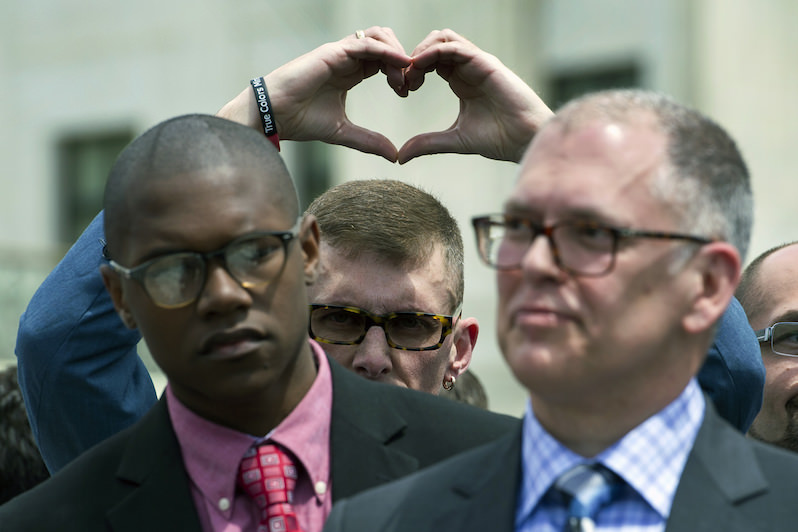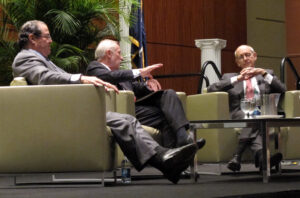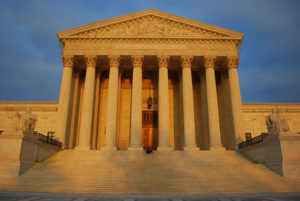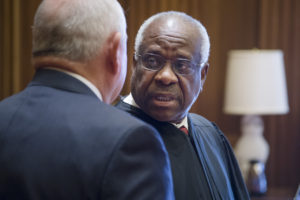Same-Sex Marriage: Will SCOTUS Make It Official?
The once-unthinkable is about to happen. Get ready.

Plaintiff Maurice Blanchard of Louisville, Ky., makes a heart with his hands behind plaintiff James Obergefell of Ohio, right, outside the Supreme Court in Washington after arguments on same-sex marriage Tuesday. (AP / Cliff Owen)
When I use the word “unthinkable” in connection with the Supreme Court under the leadership of Chief Justice John Roberts, I typically have in mind the long line of unthinkably bad decisions the court has issued since Roberts assumed office in 2005.
Topping the list are such abominations of constitutional law and statutory interpretation as the 2010 Citizens United case, which opened the floodgates on campaign spending in federal elections; the 2012 ruling in Shelby County v. Holder, which gutted the Voting Rights Act; and last year’s decree in Burwell v. Hobby Lobby, which recognized the religious personhood of closely held corporations.
When it comes to the constitutionality of same-sex marriage, the opposite, shockingly, may prove to be true. If Tuesday’s oral arguments in the four appeals from Kentucky, Michigan, Tennessee and Ohio that have been consolidated under the name of Obergefell v. Hodges are any indication, the court’s historic decision on the issue will be close. But I believe that when the dust finally settles, a majority of the justices—consisting of Anthony Kennedy, Ruth Bader Ginsburg, Stephen Breyer, Elena Kagan, Sonia Sotomayor and perhaps Roberts himself—will hold that same-sex couples have a constitutional right to wed that no state may deny.
The day’s festivities included a raucous protest, with security guards escorting an anti-marriage-equality heckler from the courtroom, his shouts of “burn in hell” echoing as he departed.
Once underway, the hearing lasted two and half hours. The questions the justices asked—with the exception of Clarence Thomas, who, as usual, invoked his right to remain silent—stayed true to form.
Justice Kennedy, the court’s most frequent “swing” vote in hotly contested cases, voiced apprehension over changing a conception of marriage that had “lasted millennia,” but he also worried aloud about the fairness of excluding gay families from the “sacredness and nobility” of marriage.
Chief Justice Roberts raised similar concerns, noting that the petitioners in the case were “not seeking to join the institution [of marriage] … but to change” it. The chief also asked pointedly why same-sex marriage bans don’t amount to sex discrimination.
The panel’s liberals, on the other hand, expressed no equivocation about their support for marriage equality. Justice Breyer referred to marriage as a “fundamental liberty,” lamenting that only same-sex couples “have no possibility to participate in that fundamental liberty.” Endorsing Breyer’s observations, Justices Kagan, Ginsburg and Sotomayor emphasized that a ruling granting recognition of same-sex marriage would harm no one — least of all heterosexuals, whose rights would remain fully intact.
Expressing the opposite outlook, Justice Samuel Alito raised the specter of polygamy, asking that if the petitioners prevailed, what would prevent a group of two men and two women from obtaining a marriage license. Justice Antonin Scalia, long renowned for his homophobic diatribes, warned that a pro-equality ruling would force clergy to perform same-sex ceremonies in violation of their religious beliefs.
Given the Roberts court’s overall track record and in view of where the nation as a whole stood until very recently, if the liberals joined by either Kennedy or the chief prevail, the court’s final decision will still be “unthinkable” — but in the most enlightened sense of the word.
Now, I’m not saying that victory is assured. It is entirely possible that a majority of the justices will align once again with the enemies of progress and deliver a repugnant surprise. Oral arguments can be deceiving. So before we pop the champagne or pen any epitaphs on anti-gay bigotry, let’s consider a little background:
The Obergefell cases were brought by over 30 litigants to topple same-sex marriage bans in the four states that comprise the territorial jurisdiction of the 6th U.S. Circuit Court of Appeals.
Some, including plaintiffs April DeBoer and Jayne Rowse of Michigan, have yet to wed. Others, including Greg Bourke and Michael DeLeon of Kentucky and Valeria Tanco and Sophy Jesty of Tennessee, were legally married elsewhere, but their unions have not been accepted in their new locations.
The lead party, real estate broker James Obergefell of Ohio, presents yet another factual scenario. In July 2013, Obergefell married his longtime and gravely ill companion, John Arthur, who suffered from Lou Gehrig’s disease, in Maryland, which recognizes same-sex marriage. When they returned to Ohio, they filed a federal lawsuit to compel the state to acknowledge their nuptials, but Arthur died a few months later. Obergefell wants Ohio to list him as a surviving spouse on Arthur’s official death certificate.
In each of the consolidated cases, federal district judges ruled in favor of the plaintiffs. Last November, however, in a ponderous 2-1 opinion written by Judge Jeffrey Sutton, the 6th Circuit reversed. Sutton, an appointee of former President George W. Bush, asserted that his hands were tied by an obscure 1972 Supreme Court decision — Baker v. Nelson — that consisted of a one-sentence order, dismissing a same-sex couple’s petition for “want of a substantial federal question.”
Citing Baker, Sutton admonished that the definition of marriage has traditionally been left to the states and is best decided by voters and legislatures. But he didn’t stop there. Assuming for argument’s sake that Baker actually isn’t binding precedent, Sutton concluded the marriage bans under his review are lawful because same-sex marriage—as distinct from heterosexual marriage — is not a fundamental constitutional right. The bans, he continued, rationally further states’ legitimate interests in regulating sex, specifically “male-female intercourse.” In Sutton’s view, the bans also legitimately reflect the states’ rational policy decisions to “wait and see [how gay marriage plays out in other locations] before changing a norm that our society (like all others) has accepted for centuries.”
With Sutton clinging to the past, the 6th Circuit became the first — and thus far only—federal appellate panel since the Supreme Court’s 2013 decision in United States v. Windsor to uphold state restrictions on marriage equality. The 4th, 7th, 9th and 10th Circuits have gone the other way.
By a vote of 5-4, Windsor invalidated Section 3 of the Defense of Marriage Act and compelled the federal government to recognize same-sex marriages approved by the states. Windsor did not, however, resolve the constitutionality of state laws that continue to limit marriage to heterosexual pairings. According to Lambda Legal, same-sex marriages currently are recognized in 36 states, the District of Columbia and parts of Kansas and Missouri but not in the rest of the country.
To clear up the double standards and settle the split among the federal circuits created by Sutton’s opinion, the Supreme Court agreed in January to hear the Obergefell cases, directing the parties to address two key points:
1) Does the Fourteenth Amendment require a state to license a marriage between two people of the same sex? 2) Does the Fourteenth Amendment require a state to recognize a marriage between two people of the same sex when their marriage was lawfully licensed and performed out-of-state?
Before Tuesday’s hearing, few commentators predicted that same-sex marriage opponents would win on both counts. Still, some cautioned that we could be looking at a split decision—that in a nod to federalism and states’ rights, the court would allow recalcitrant jurisdictions not to issue their own gay-marriage licenses but require them to accept out-of-state ceremonies.
I think not. After much hand-wringing and deliberation, a majority of the justices, either by a margin of 6-3 or 5-4, will brush aside Baker v. Nelson and answer “yes” to both key constitutional questions.
It’s not just the civil rights and gay communities that are asking the court to do so. In what is surely an unprecedented step, 379 of the world’s largest employers and employer organizations—including corporate giants Apple, Alcoa, Aetna, Microsoft, JP Morgan Chase, American Express, Google and Facebook—have filed an amicus (“friend of the court”) brief advising that same-sex marriage restrictions are bad for business.
The court’s decision is due by the end of June. Until then, the biggest element of suspense won’t be whether the high tribunal will declare same-sex marriage bans unconstitutional, but how far—from a constitutional perspective — it will go to define and protect marriage equality.
Both the equal protection and due process clauses of the 14th Amendment will figure prominently in any final ruling, as they did in Loving v. Virginia, the 1967 landmark crafted by Chief Justice Earl Warren that overturned prohibitions on interracial marriage.
Under equal protection principles, laws that treat (or in constitutional parlance, “classify”) people differently are subjected to varying degrees of judicial scrutiny to test their legality. The tests range from what is called the “rational-basis” standard, which is highly deferential to the judgment of legislatures and electorates (and was used by Judge Sutton) to the “strict scrutiny” test, which is the least deferential and the hardest to satisfy.
Frequently used to review economic regulations, the rational-basis model requires only that a statute be logically related to a legitimate governmental purpose. By contrast, laws that classify people on the basis of race, religion, alienage or national origin (so-called “suspect” classifications), and those that impair fundamental rights, trigger strict scrutiny. To withstand equal-protection discrimination challenges, such laws must further a “compelling state interest” and be narrowly tailored to achieve that interest. Strict scrutiny is also applied to due process claims when fundamental rights are implicated.
In Loving, the Supreme Court proclaimed that “marriage is one of the basic civil rights of man” and evaluated Virginia’s ban on interracial marriage — and those then in effect in 15 other states—under strict scrutiny. Applying that benchmark, the court determined that the bans ran afoul of both equal protection and due process.
In their briefs, the lawyers representing Obergefell and his co-petitioners urged the court to follow Loving’s teachings and regard same-sex marriage as another iteration or subset of the fundamental right to marry. As such, they were not asking the court to carve out a new constitutional entitlement but to expand one that has long been established.
As a fallback, they argued that same-sex marriage bans are so illogical and founded in animus and prejudice that they can’t even withstand rational-basis review. This was the approach taken by Justice Kennedy in his majority Windsor opinion, as well as by former District Judge Vaughn Walker in his blockbuster 2010 decision declaring California’s Proposition 8 unconstitutional.
Clearly, it would be best if our most powerful judicial body accorded same-sex marriage the greatest degree of constitutional protection possible. But the Roberts court remains an essentially conservative panel that has been dragged into an epic battle by an overwhelming sea change in public opinion and the steadfast militancy of the gay-rights movement. Nonetheless, even if the court chooses some intermediate legal theory on which to ground its opinion, it is poised to discard the country’s last same-sex marriage bans, dispatching them to the proverbial dustbin of history.
The once-unthinkable is about to happen. Get ready. Marriage equality is the future.
Independent journalism is under threat and overshadowed by heavily funded mainstream media.
You can help level the playing field. Become a member.
Your tax-deductible contribution keeps us digging beneath the headlines to give you thought-provoking, investigative reporting and analysis that unearths what's really happening- without compromise.
Give today to support our courageous, independent journalists.





You need to be a supporter to comment.
There are currently no responses to this article.
Be the first to respond.